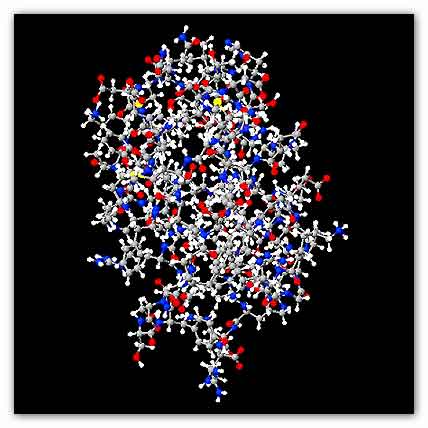|
New research reveals that Parkin, a protein linked to some cases of early-onset Parkinson's disease, regulates how cells in our bodies take up and process dietary fats. The finding suggests that defective Parkin may contribute to early-onset Parkinson's by changing the amount and types of fat in the body.

Mutations in the gene for Parkin are present in as many as 37% of early-onset Parkinson's cases. The protein appears to play a role in marking proteins for recycling within the cell. However, its complex structure and other lines of evidence hint at other
functions.
Some studies have tied lower levels of cholesterol and fatty acids with an increased risk of Parkinson's disease. A team of researchers from NIH's National Heart, Lung and Blood Institute (NHBLI) and National Institute of Neurological Disorders and Stroke (NINDS) noted that, while laboratory mice with defective Parkin don’t display any obvious signs of the disease, they don’t gain weight with age as normal mice typically do. The team thus set out to investigate whether Parkin might play a role in fat metabolism. The study appeared online in the August 25, 2011, issue of the Journal of Clinical Investigation.
When the researchers fed Parkin-deficient mice a high-fat, high-cholesterol diet, the mice didn’t gain weight or reduce their activity levels the way regular mice do. The researchers discovered that the Parkin-deficient mice had lower levels of proteins responsible for the transport of fat in the body. Adding the gene for Parkin back to the mice’s livers restored both fat uptake and fat transporter protein levels.
The researchers saw a similar pattern when they analyzed blood cells from patients enrolled at the NIH Parkinson's Clinic. Cells from patients with Parkin mutations had a limited ability to absorb fat. This result provides evidence that the findings could be relevant to humans.
"This discovery shows that the clues to understand Parkinson's disease may not necessarily be in the brain," says study leader Dr. Michael Sack of
NHLBI.
As to how fat may be important in Parkinson's, Sack notes that the brain cells destroyed during the course of the disease are found in a brain region called the substantia nigra, which controls movement, among other roles. “The neurons in this part of the brain are extremely active. Each one has over 300,000 connections and is continuously transmitting information,” he says. “These neurons require good support in the form of their fat and cholesterol membrane. If the right types of fat aren’t available, then cell integrity will be sub-par and they could be prone to damage.”
Sack and his colleagues now plan early-stage clinical studies on the connection between fat metabolism and Parkinson's. They will continue working with the NIH Parkinson's Clinic and encourage patients to participate in the research as it moves
forward.
Source
National Institutes of Health (NIH)
(MDN)
|
![]()